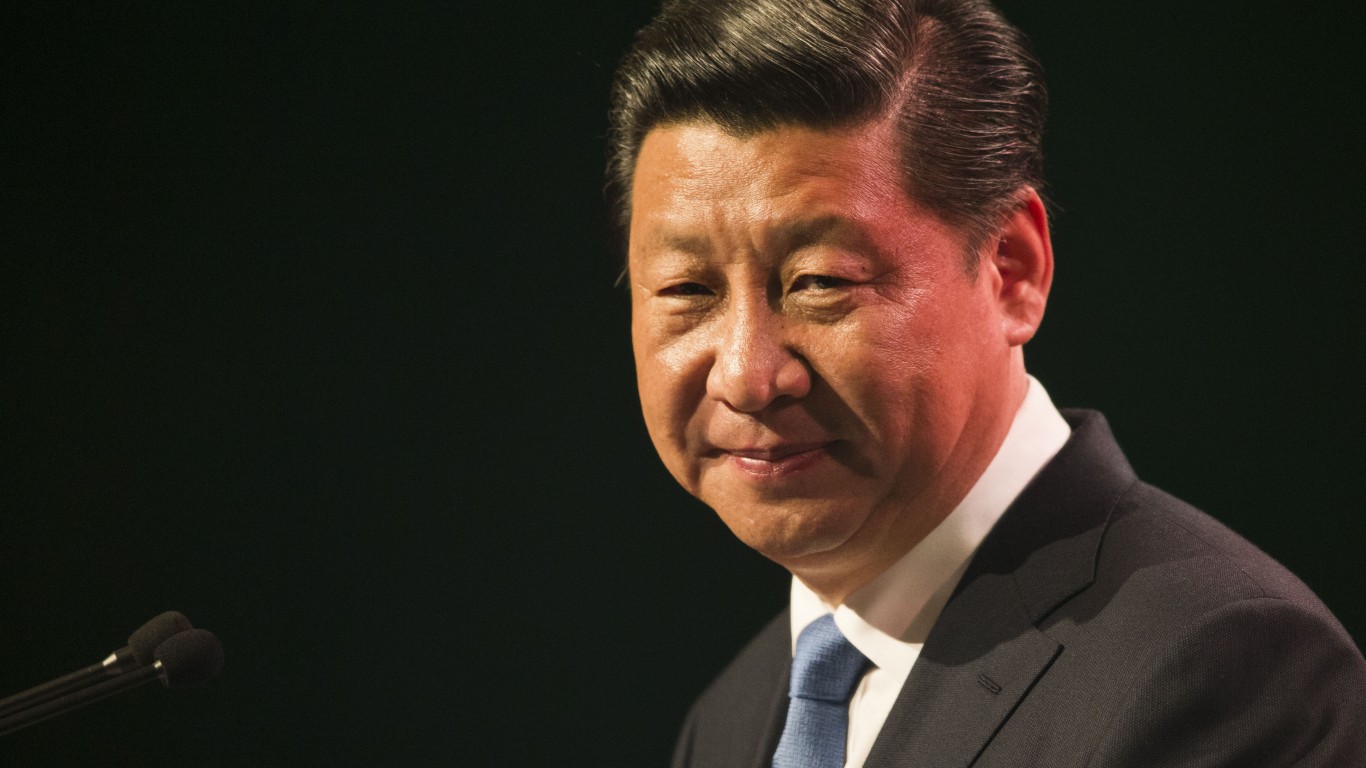
24/7 Wall St. Insights
- The highest opinion poll results by leaders on this list are usually achieved by enacting public policy to help the lower classes or by manipulating public media and suppressing dissent.
- Extreme far-left leaders and left-wing worker leaders top the list of most popular world leaders.
- 24/7 Wall St. is your home for all things related to market finance, investments, and business. Get started by downloading our free report about the two stocks we recommend every investor hold forever.
What makes a world leader good or bad? Is it the impact of their decisions decades after they leave office, their personal morality, or their popularity while in office? Despite the true answer, we decided to go with public opinion polls for this list.
While the objectivity, accuracy, and usefulness of public polls will always be contested, it is interesting to compare the popularity of world leaders while they are in office, especially since these polls influence their decisions in some ways. For this list, all our data is current as of September 2024 and is taken from public opinion polls in each country.
So, who are the best leaders on Earth?
Why Are We Talking About This?

Too often we tend to take a very narrow view of the world, limiting our opinion of the state of the world to what our current leader does, regardless of how everyone else is doing. By looking at other countries, their leaders, and what their citizens approve and disapprove of, we can better analyze where we are and how we can proceed.
#25 Fumio Kishida
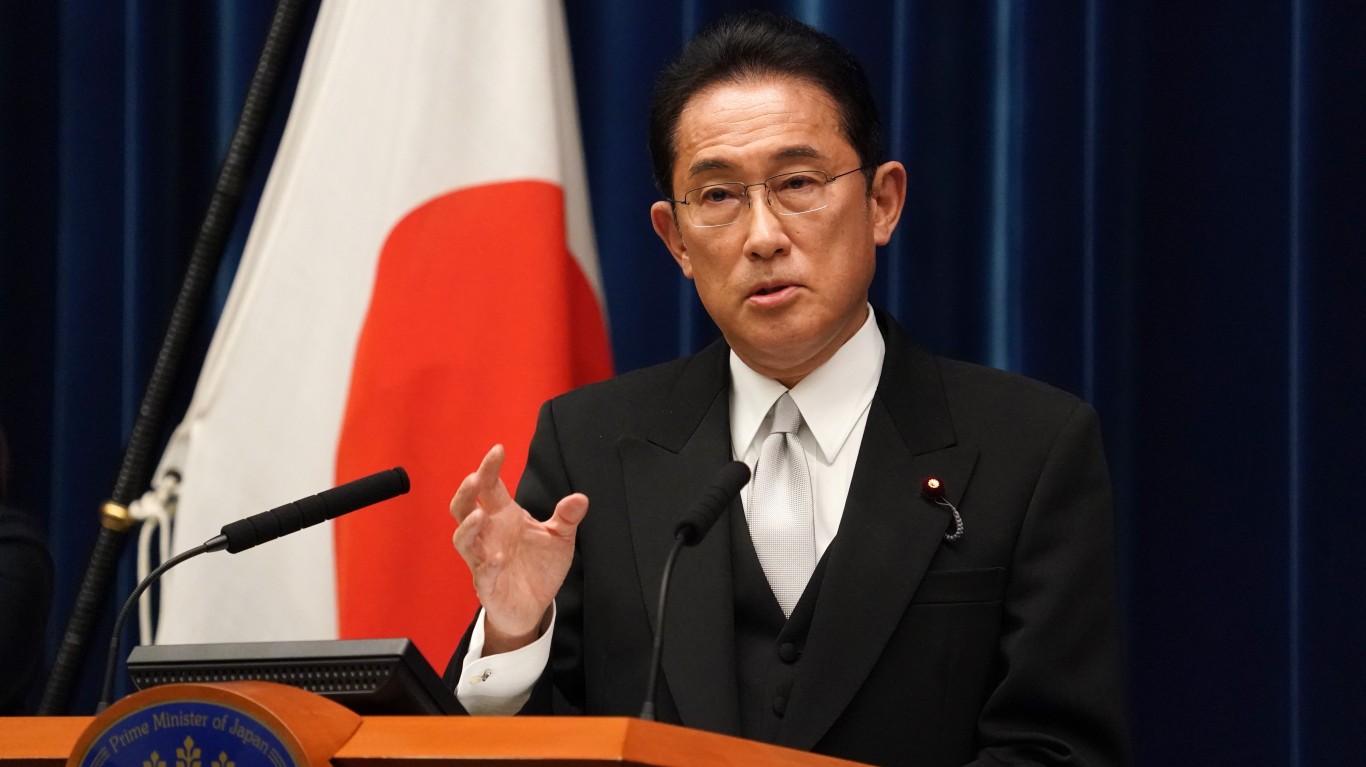
- Country: Japan
- Approval: 15%
Fumio Kishida, the worst of the best on this list, was born into a political family and has spent most of his professional career in politics. He was elected Prime Minister in 2021. Kishida said that his administration will focus on a “new model of capitalism” and on expanding the middle class.
He increased Japan’s military spending by more than 65% amid many funding scandals, resulting in record-low approval ratings. He survived an assassination attempt in 2023. Kishida said he would step down as the leader of his party and not seek reelection in September of 2024.
#24 Yoon Suk-Yeol
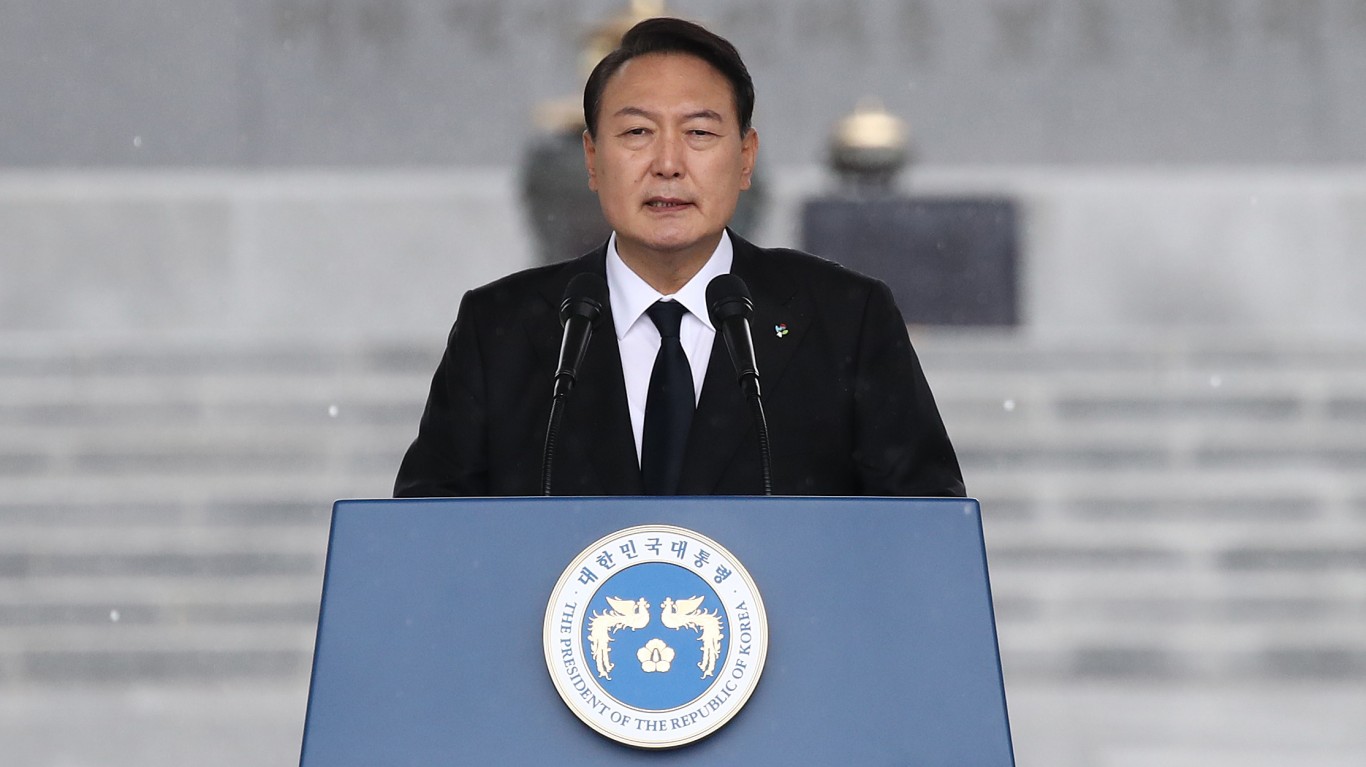
- Country: South Korea
- Approval: 17%
Yoon Suk-Yeol was elected as president of South Korea in 2022. Yoon won the election on promises of economic deregulation and abolishing the Ministry of Gender Equality and Family. His work on these socially conservative initiatives resulted in his abysmally low approval ratings in a country that is already suffering some of the worst wealth disparity in the world.
He tried to raise the maximum workweek from 52 hours to 69 hours. He implemented one of the lowest minimum wage increases in recent history. His pro-Japan foreign policy and lack of communication are also reasons for his low approval.
#23 Petr Fiala
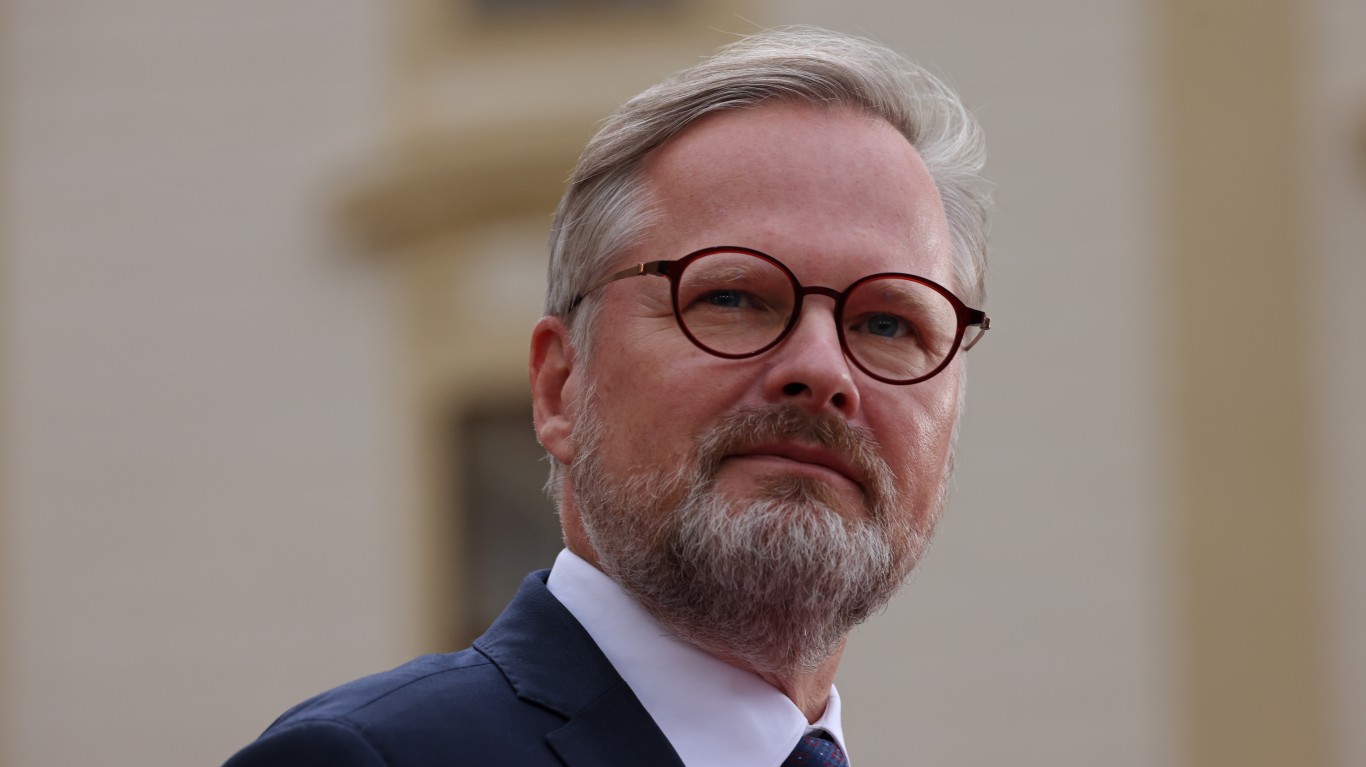
- Country: Czech Republic
- Approval: 21%
Petr Fiala has been prime minister since 2021 and has been the leader of the Civic Democratic Party since 2014. He has run on strong pro-Western and pro-European center-right issues and talking points.
He entered office promising to take control of the fast-growing national debt, but then Russia invaded Ukraine. The Czech Republic has received the highest number of Ukrainian refugees per capita than any other country, and aid sent to Ukraine, among other costs, has prevented any reasonable control being taking on the debt.
The reasons for his low approval rating include rising inflation, the global energy crisis, the fall of real wages, and his strong support for Israel.
#22 Olaf Scholz
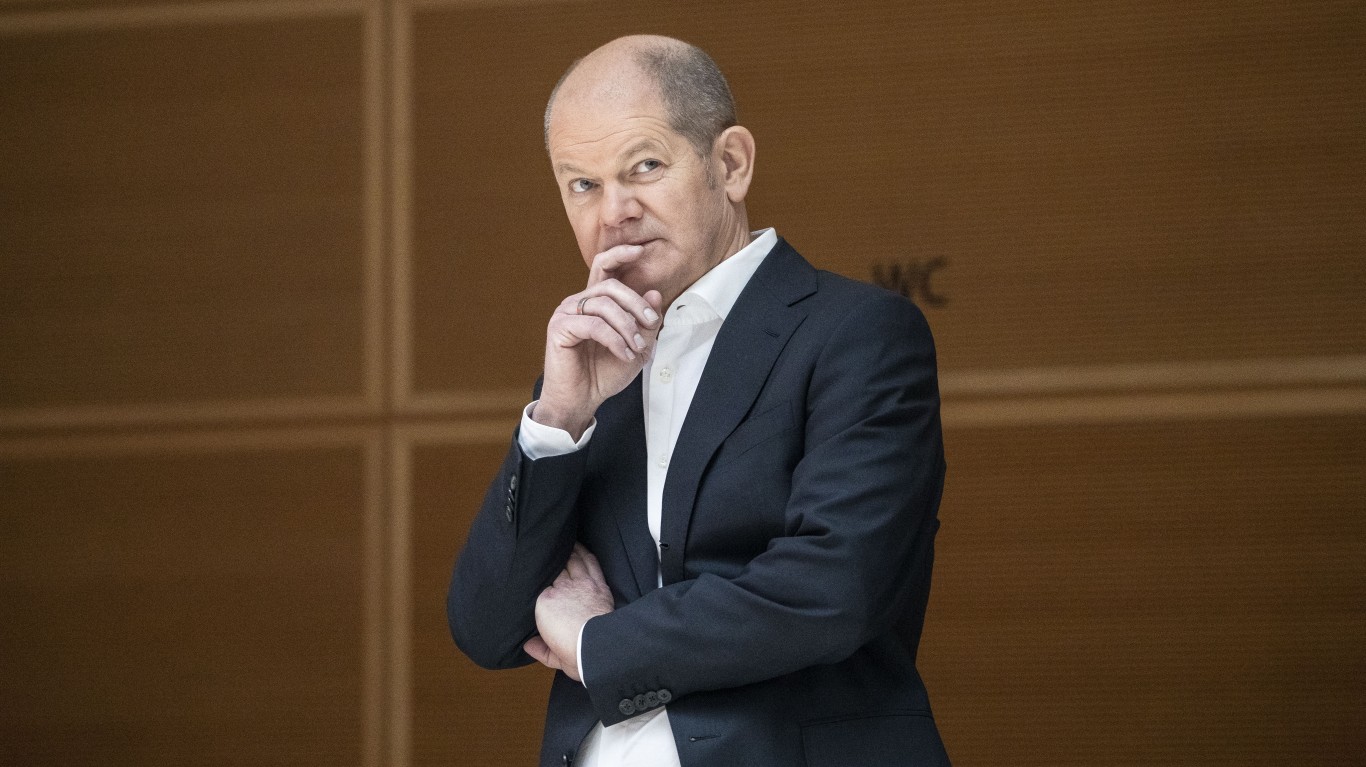
- Country: Germany
- Approval: 22%
Olaf Scholz was elected chancellor of Germany in 2021 as a member of the Social Democratic Party, succeeding Angela Merkel after her fourth government.
Under Scholz’s leadership, Germany significantly increased its military budget, continued to reduce its nuclear power despite skyrocketing energy prices, and has been strongly critical of Palestine and supportive of Israel.
All this forced his government to cut 60 billion euros from Germany’s budget in order to fund the military increases and military support for Israel, as well as cut tax breaks for farmers and other union workers in order to make more money. This led to low approval ratings and the massive 2023–2024 German farmers’ protests.
#21 Emmanuel Macron
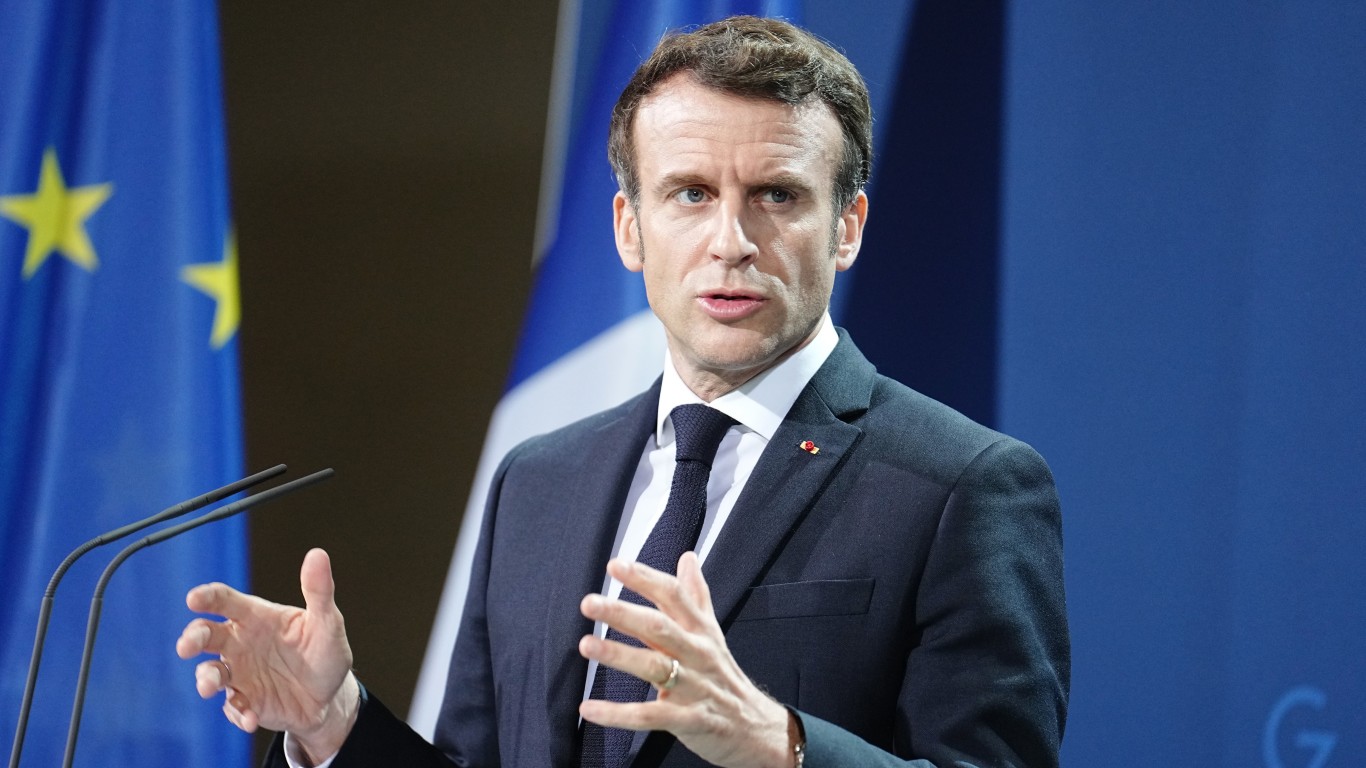
- Country: France
- Approval: 23%
Emmanuel Macron was elected president of France in 2017 and was the youngest president in French history. He passed a law raising the retirement age to 64 from 62, leading to protests. He also increased military spending by 40% even though it had a huge forecasted deficit and had to cut money from its overall budget.
After a devastating defeat in the 2024 European Parliament elections, Macron called for a snap election, in which the left-wing New Popular Front party made massive gains in the government, a direct result of the far-right’s policies and gains in Europe, leading to a deadlock.
#20 Justin Trudeau
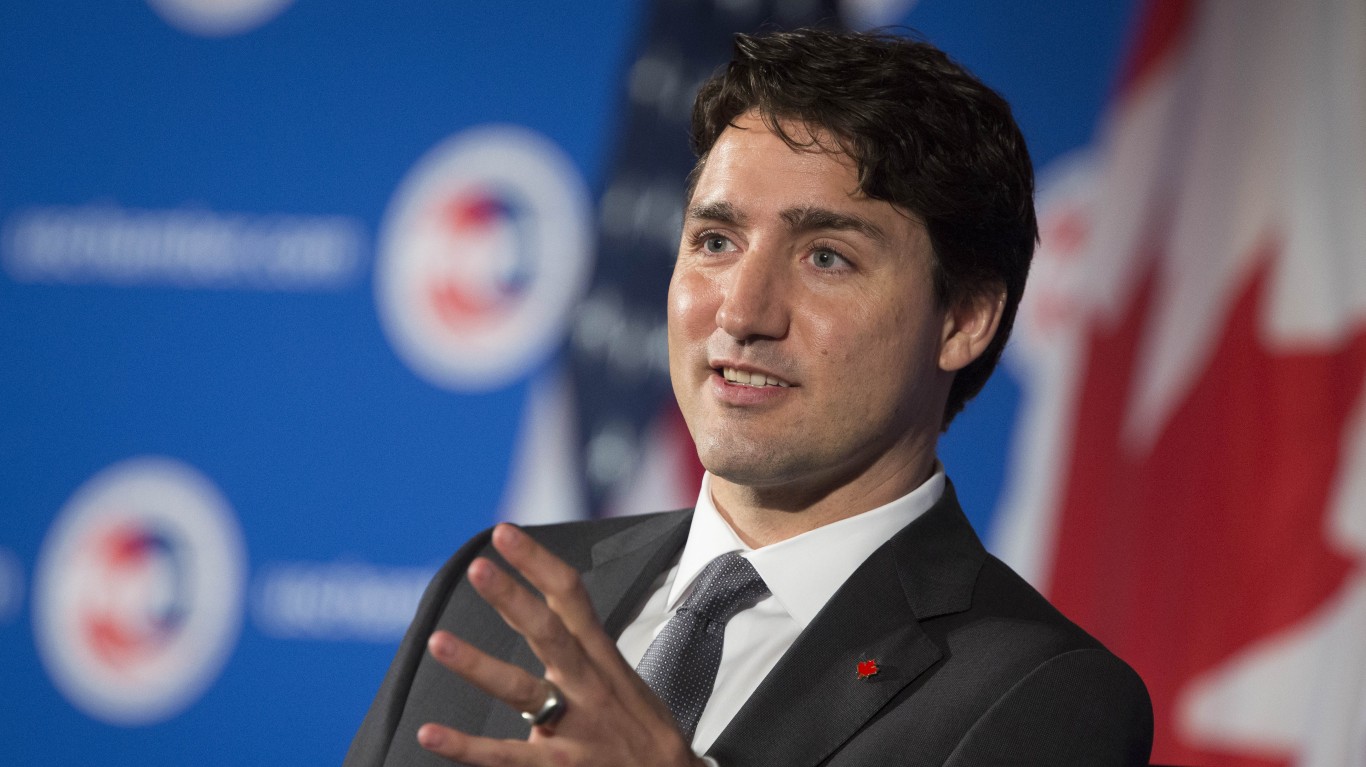
- Country: Canada
- Approval: 28%
Justin Trudeau was elected as the 23rd prime minister of Canada in 2015 as part of the center-left Liberal Party. His major political victories include creating the Canada Child Benefit, legalizing medically assisted dying, legalizing medical and recreational use of Cannabis, and more. In his second government following another election victory in 2019, he led his country through COVID-19, instituted a ban on assault-style weapons, and created the $10-a-day childcare program.
His popularity dropped after he announced his support for Israel in its genocide against Palestine and rejected calls for a ceasefire.
#19 Recep Tayyip Erdogan
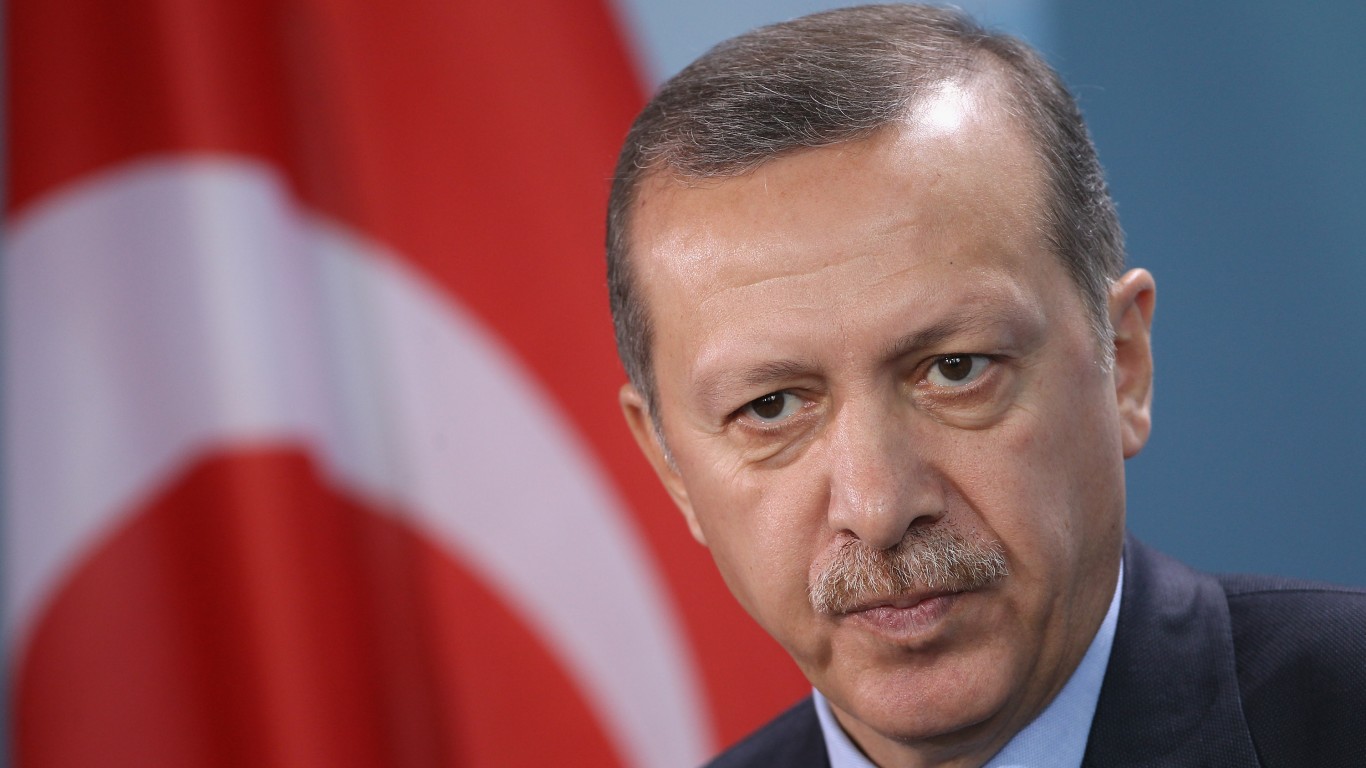
- Country: Turkey
- Approval: 31%
With a list of some of the most popular and powerful people in the world, it is a given that we will encounter some authoritarian shenanigans and manipulation of the polls, Erdogan is our first example of this on our list and not our last.
In 1994, he said, “Democracy is like a train: when we reach our destination, we get off”. And has been convicted of inciting religious hatred and violence.
Erdogan was elected president of Turkey in 2014 after being prime minister since 2003. His time in office has been notable for his policies that led to high inflation, deflation of the Turkish lira, the erosion of democratic institutions, authoritarian practices, and expanding executive powers.
Erdogan has also suppressed opposition and dissent in the media, including arresting journalists, arresting political opponents, and more.
#18 Jonas Gahr Store
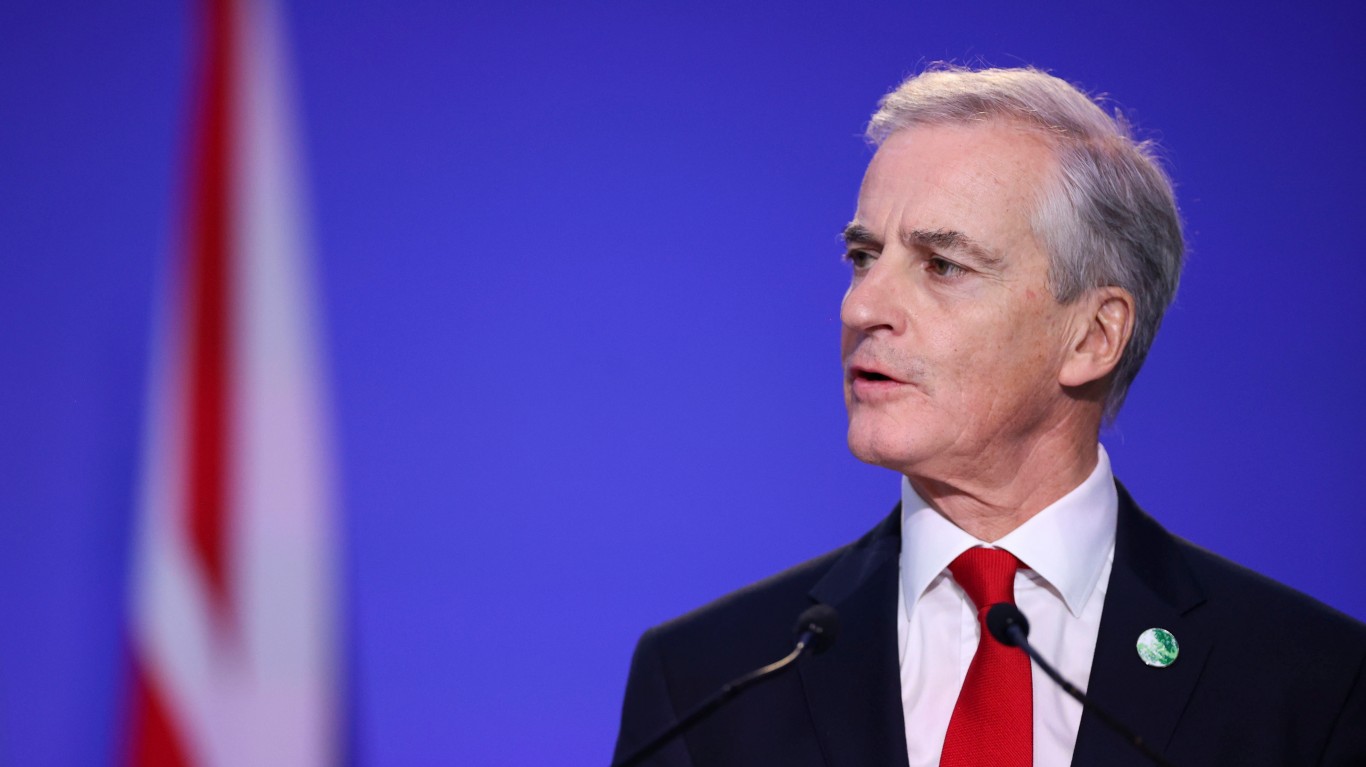
- Country: Norway
- Approval: 32%
Store has been the prime minister of Norway since 2021 and is a member of the Labour Party.
Store’s premiership has struggled with high energy costs, COVID-19, and other high costs associated with living in Norway. However, Store received widespread praise and strong support after recognizing Palestine as an independent state in 2024. Israel recalled their ambassador as a consequence
#17 Cyril Ramaphosa
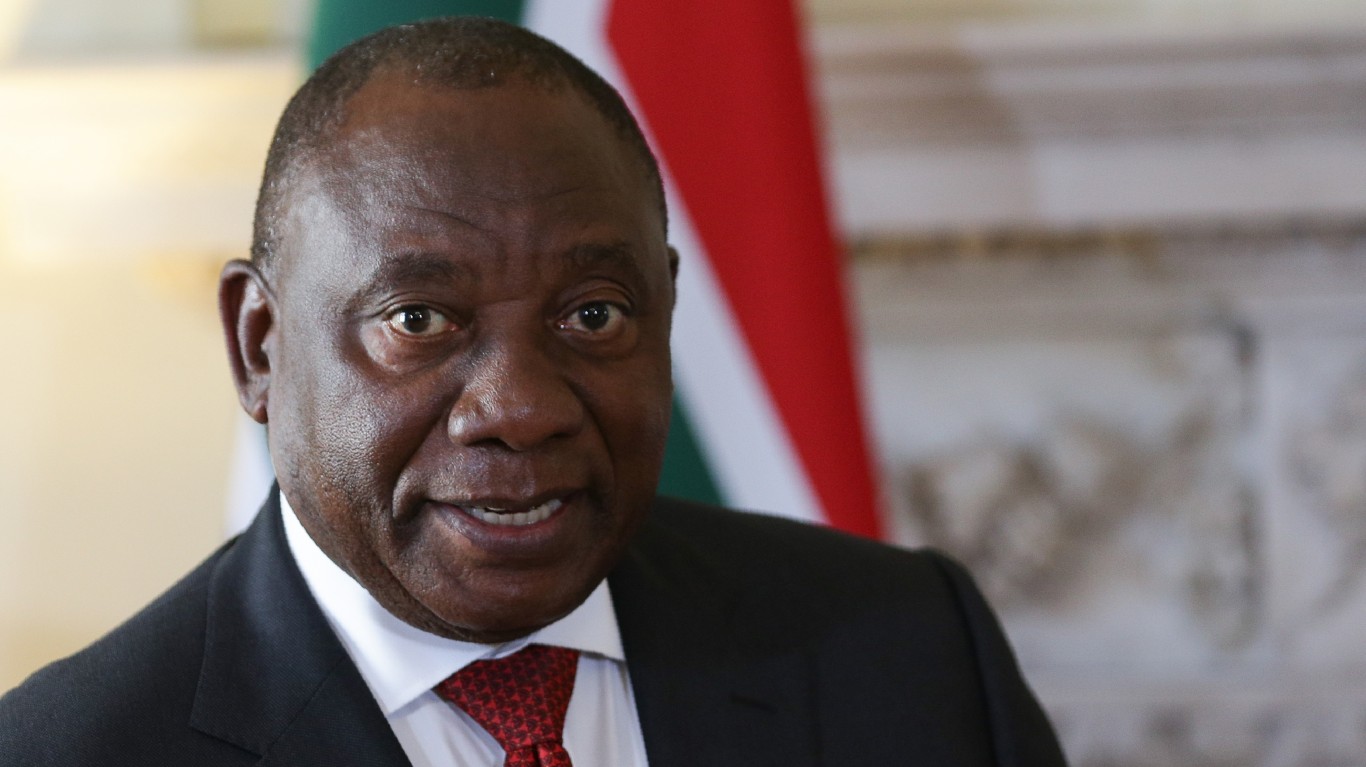
- Country: South Africa
- Approval: 34%
Cyril Ramaphosa has been the president of South Africa since 2018. He is a long trade union leader and anti-apartheid activist.
His presidency has focused on growing the South African economy, closing the gender gap, increasing tourism, and maintaining Nelson Mandela’s legacy.
Cyril Ramaphosa is a multi-millionaire (with a net worth of over $450 million) and has been strongly criticized for using the government to benefit his personal business interests.
#16 Ulf Kristersson
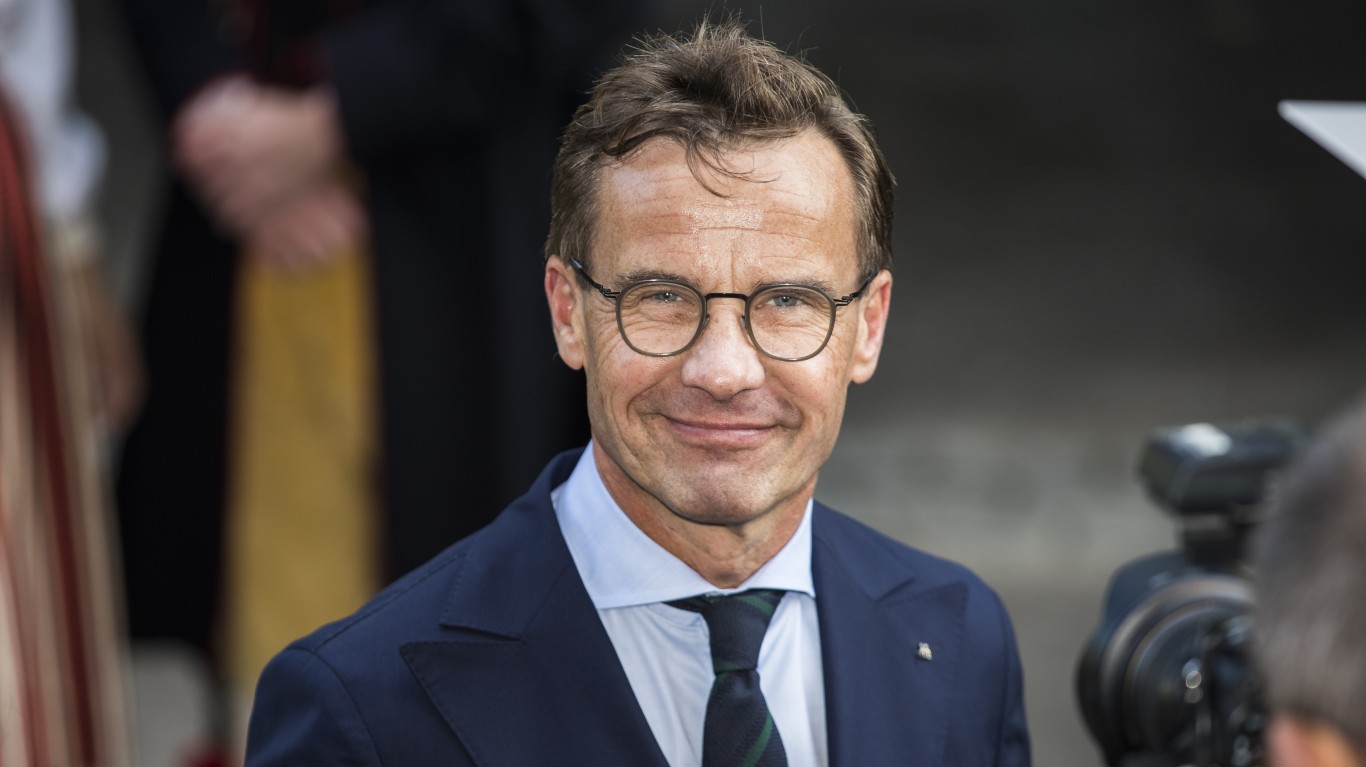
- Country: Sweden
- Approval: 37%
Ulf Kristersson has been the prime minister of Sweden since 2022 and is a member of the liberal-conservative Moderate Party.
During Ulf Kristersson’s first weeks in office, he removed the ban on building new nuclear reactors, abolished taxes on the cogeneration of electricity, expanded the incentives to build new wind power plants, and more. He has also overseen the largest expansion of Sweden’s hydroelectric power in the last four decades.
#15 Pedro Sanchez
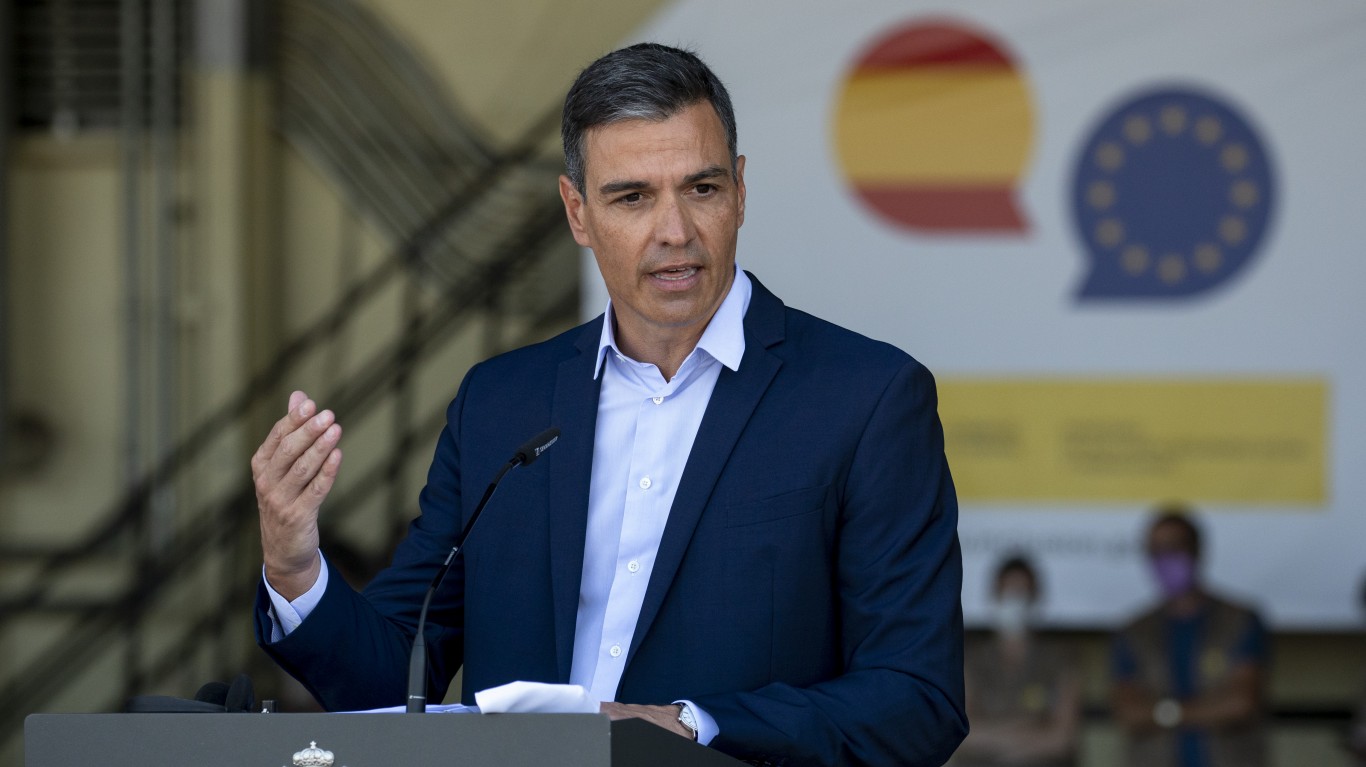
- Country: Spain
- Approval: 37%
Pedro Sanchez has served as Spain’s prime minister since 2018 and is a member of the Spanish Socialist Workers’ Party. He is also the president of the Socialist International. He was appointed to his third term in 2023.
Sanchez’s time in office has been dedicated to increasing unemployment benefits, promoting equal pay between men and women, and more social and economic plans to help the lower classes.
Pedro Sanchez has criticized Israel during its genocide in Palestine and has promised to work with Europe to recognize Palestine as an independent country. He is one of the most pro-Palestine voices in all of Europe. Spain officially recognized Palestine on May 28, 2024, and it also joined South Africa’s genocide case filed against Israel. At a NATO summit in July of 2024, Sanchez said, “If we demand respect for international law in Ukraine, we must demand it in Gaza as well”.
#14 Joe Biden
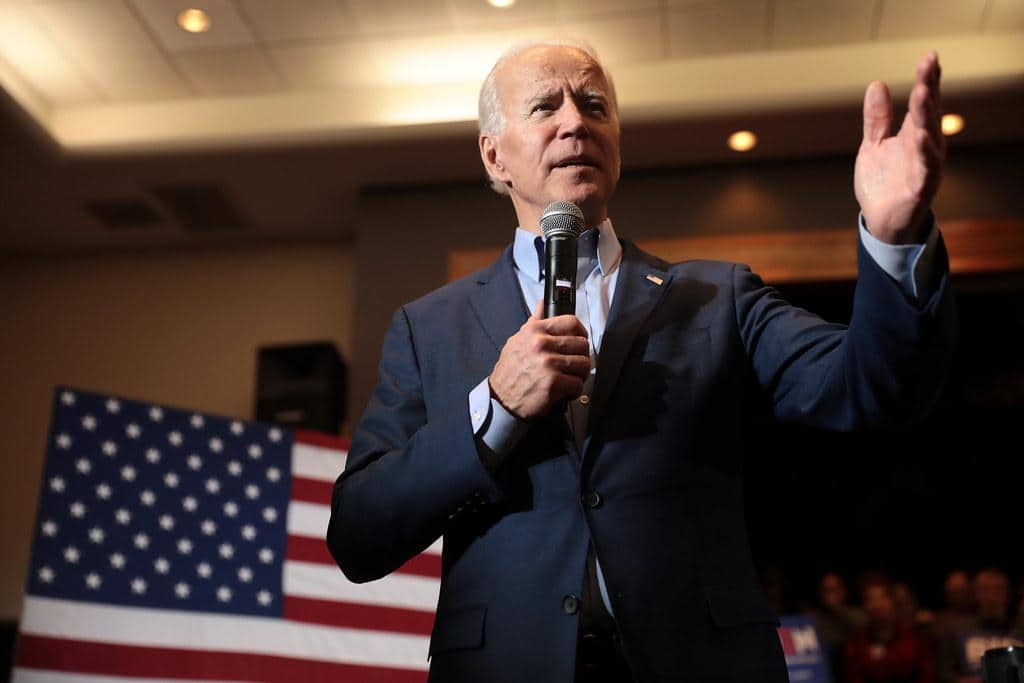
- Country: United States
- Approval: 37%
Joe Biden was the oldest person to be elected to the presidency. Since being elected the 46th president of the United States in 2021, he has been responsible for declaring Juneteenth a federal holiday, re-joined the Paris climate agreements, passed several laws to better control guns in the United States, pardoned all Americans who had been convicted of possession of small amounts of cannabis, increased the minimum wage for federal contractors to $15, and more. He was the first president to join striking workers on their picket line when he joined the UAW strike in Michigan.
Biden also supported one of the strongest and best immigration bills in decades that had wide bipartisan support. However, former president Trump said that Republicans should vote ‘no’ on the bill because he didn’t want to give Biden such a big political win. The bill failed.
Biden’s approval jumped in 2024 after he announced he would drop out of the presidential race in favor of Kamala Harris.
#13 Karl Nehammer
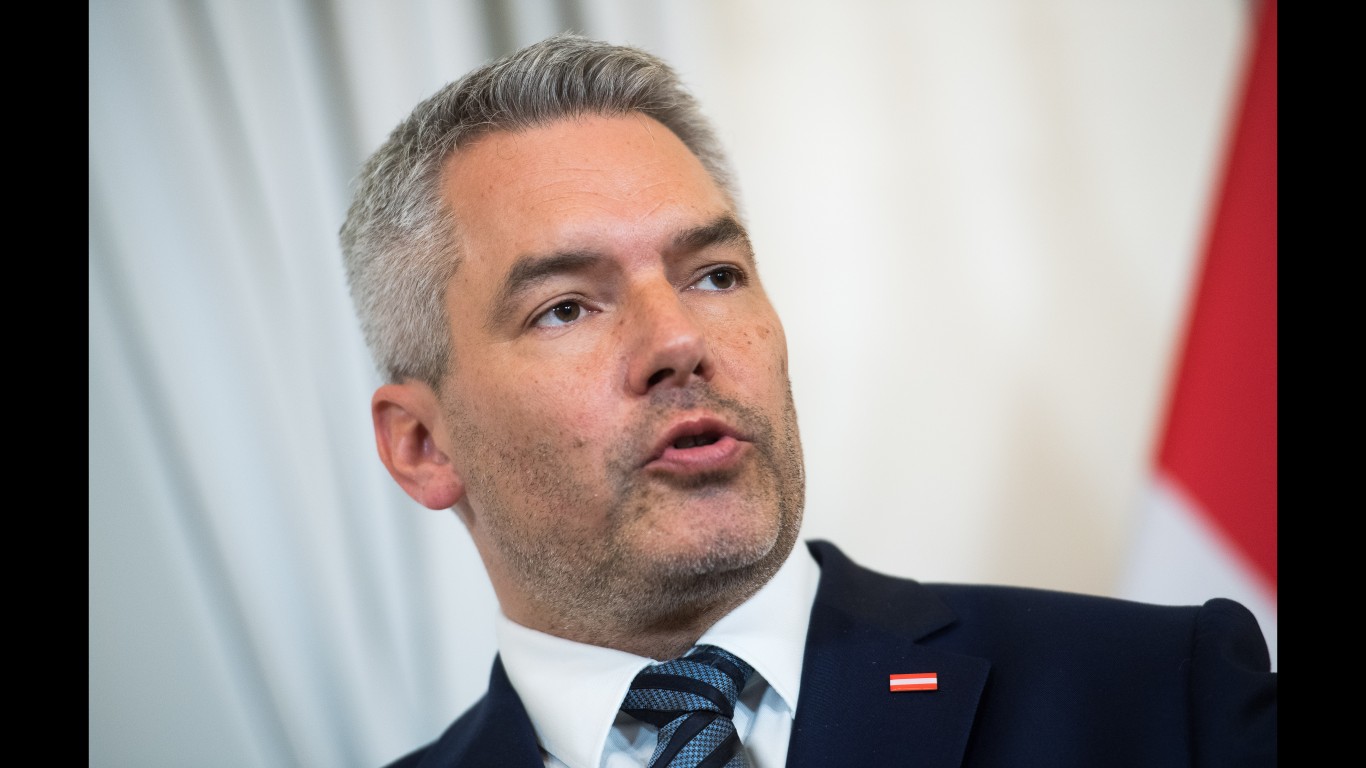
- Country: Austria
- Approval: 38%
Karl Nehammer has been the chancellor of Austria since 2021 and is a member of its populist, Christian party, the Austrian People’s Party. He has been responsible for blocking Bulgaria and Romania’s access to the Schengen area and blocking Turkey’s admission into the European Union. He has strongly supported Israel and rejected calls for a ceasefire.
His popularity is mainly due to the strong nationalist and conservative wave in Austria.
#12 Alexander De Croo
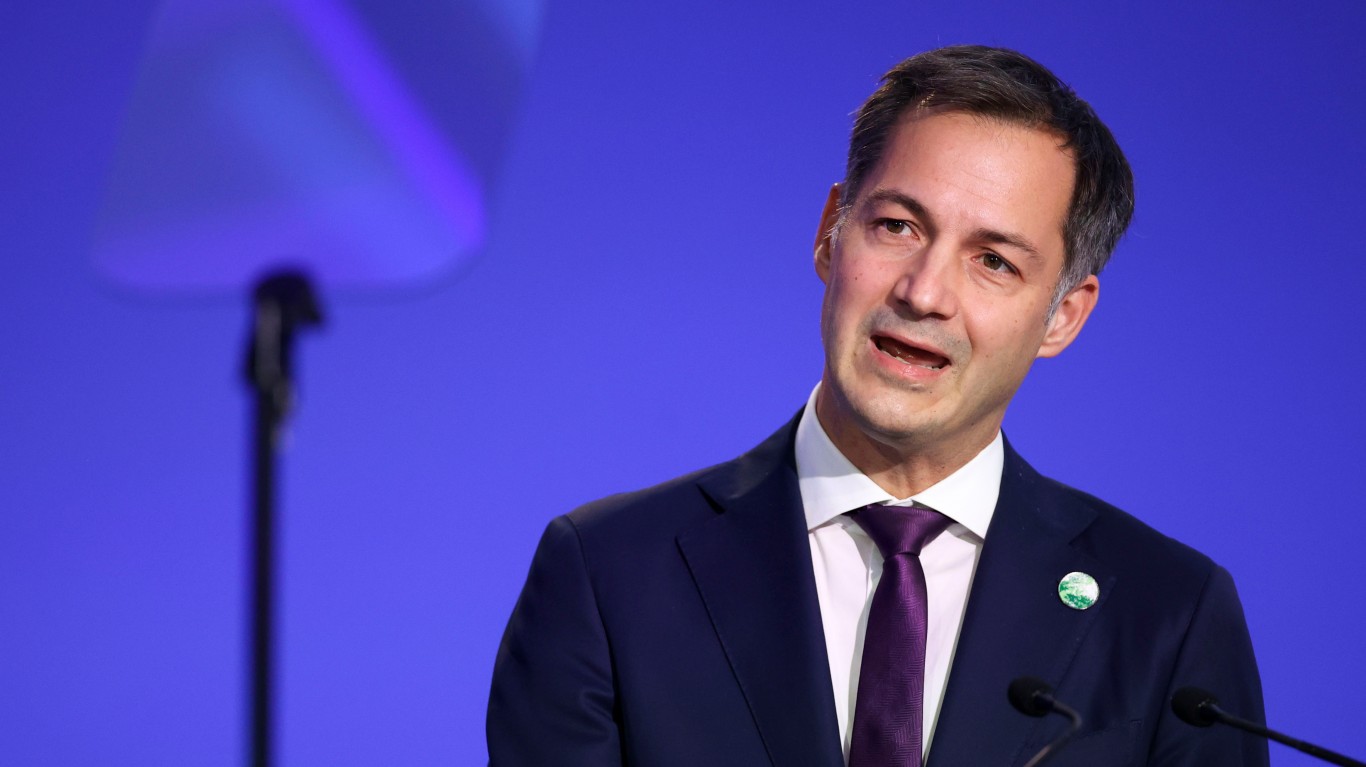
- Country: Belgium
- Approval: 38%
Alexander De Croo became Belgium’s prime minister in 2020. His government has worked to expand military spending and make the workplace more flexible for employees.
De Croo refused to take sides in the Israeli genocide in Palestine, and as a result, Israel accused him of supporting terrorism.
Alexander De Croo’s central-right party suffered a major defeat in the 2024 federal elections and he announced his resignation on June 9, 2024. He will remain in power until a new government can be formed.
#11 Dick Schoof
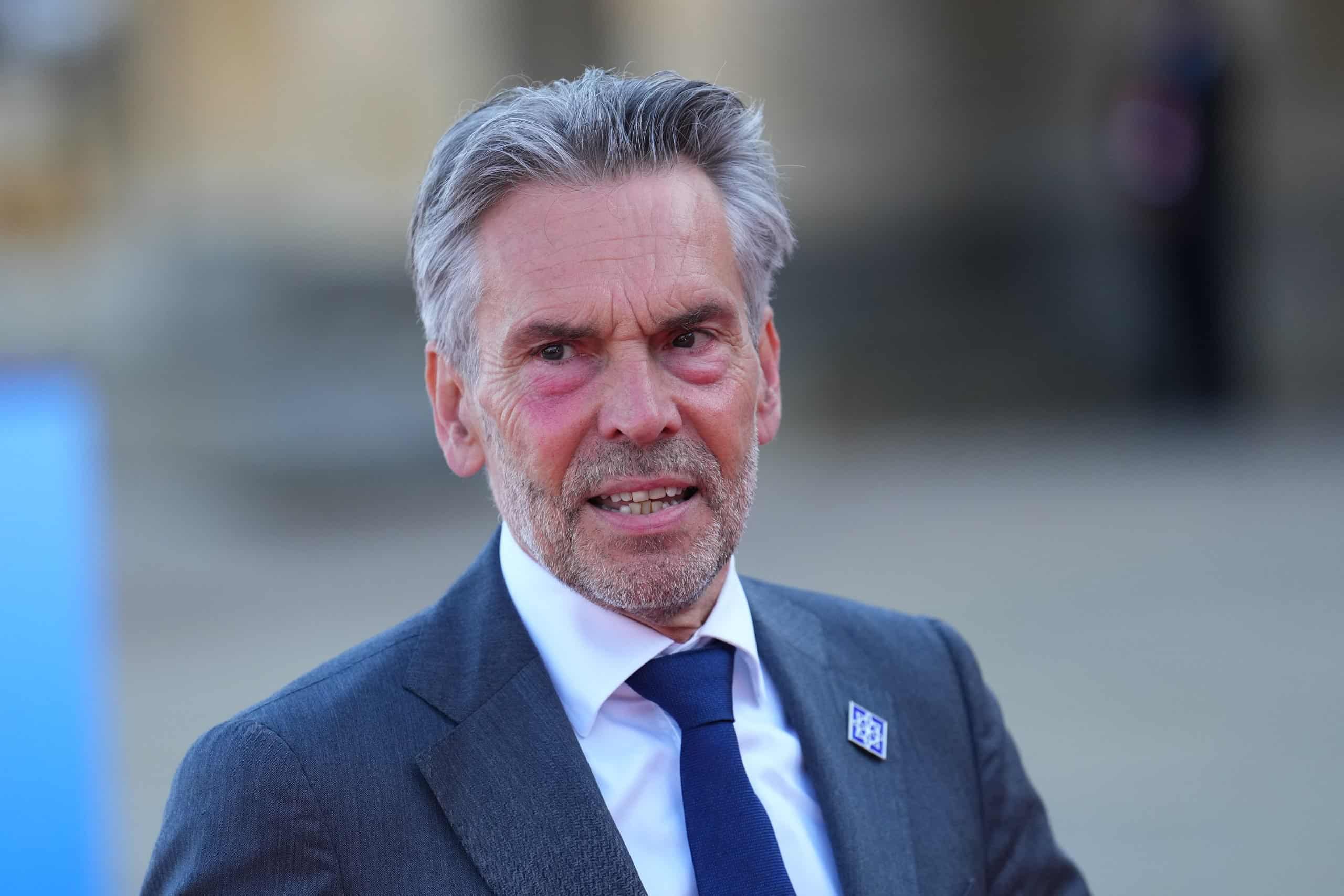
- Country: Netherlands
- Approval: 39%
Dick Schoof has been the prime minister of the Netherlands since July 2, 2024. He used to be a member of the Labour Party but was the sixth pick after the 2024 election to lead the right-wing Party for Freedom’s new government.
With such a new premiership, he hasn’t had much time to do anything of note besides banning cell phones during cabinet meetings. It remains to be seen if his initial popularity will continue.
#10 Giorgia Meloni
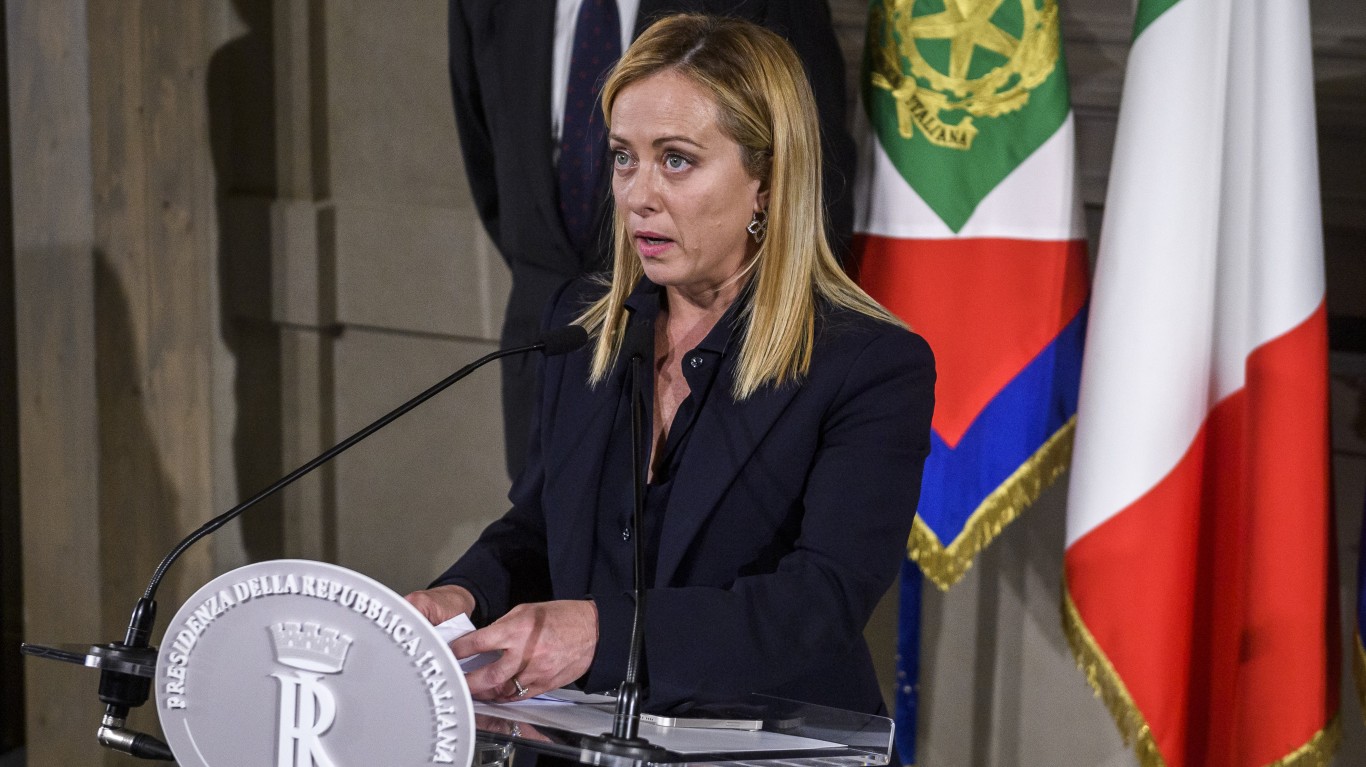
- Country: Italy
- Approval: 41%
Giorgia Meloni is the prime minister of Italy and the first woman to hold the office. She is the leader of the far right-wing party, Brothers of Italy. She was ranked as the fourth most powerful woman in the world.
Meloni used to be a member of the neo-fascist Italian Social Movement founded by Italian fascists in 1946.
Her current administration is focused on “God, fatherland, and family,” and as a result is strongly opposed to same-sex marriages, same-sex parenting, ‘globalism’, is strongly Islamophobic and xenophobic (even calling for military blockades to stop migrants from coming to Italy), and more.
Some of her more notable legislative actions include significantly increasing the power and strength of the prime minister and a law that only a child’s biological parent can be put on their birth certificate.
#9 Anthony Albanese
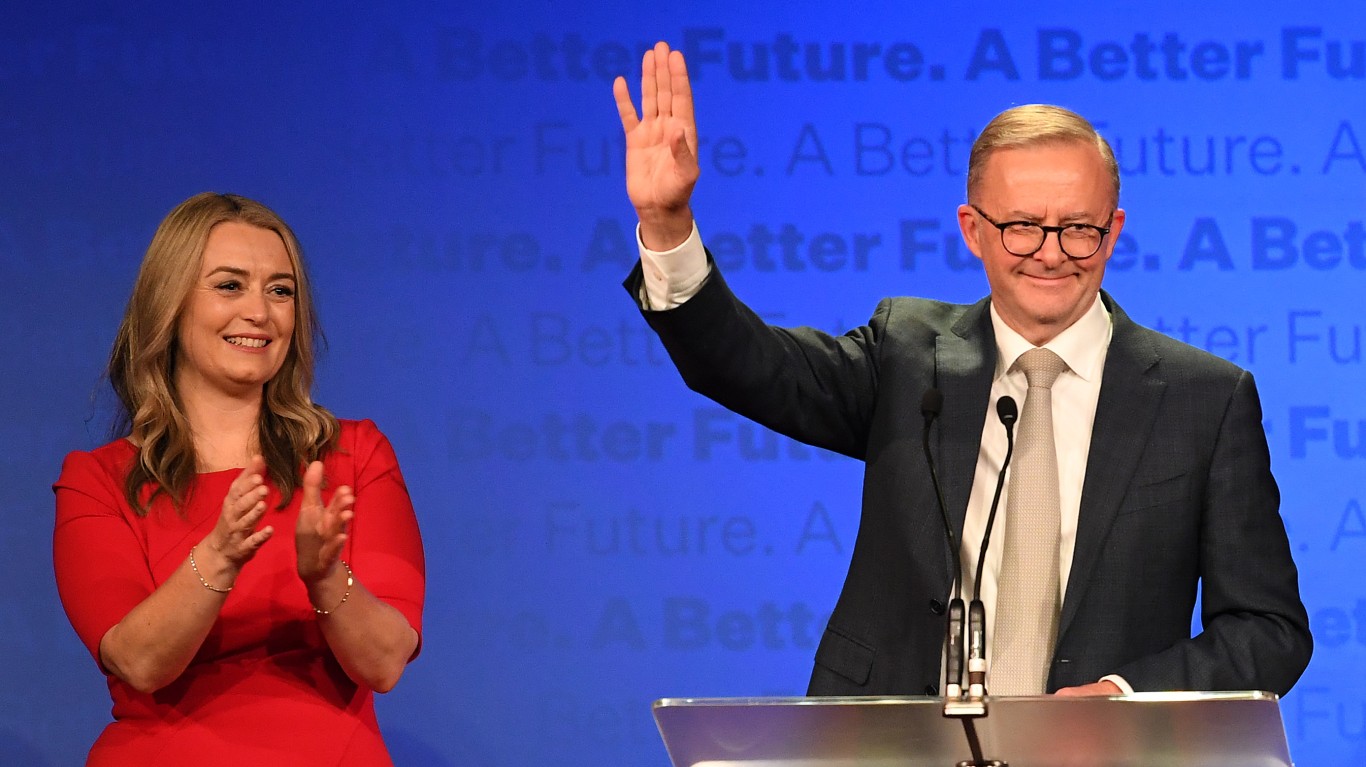
- Country: Australia
- Approval: 41%
For a country with a news and journalistic industry as corrupt as Australia’s, it is surprising that Albanese has managed to keep such a high approval rating throughout his time as the prime minister for so long. It stands as a testament to the popularity and success of his work.
Albanese is a member of the Labor Party and was appointed prime minister in 2022. His first act after the election was to introduce legislation that would include an “Indigenous Voice to Parliament”, and he also worked to increase the national minimum wage, crack down on corruption, and also was able to ease the trade restriction put on Australia by China.
In 2023, Albanese was responsible for Australia’s first budget surplus in 15 years and the largest the country had ever had. In 2024, Australia had a second budget surplus. He also cut taxes for people earning less than A$150,00 per year, a move that conservative figures and media companies strongly opposed.
#8 Simon Harris
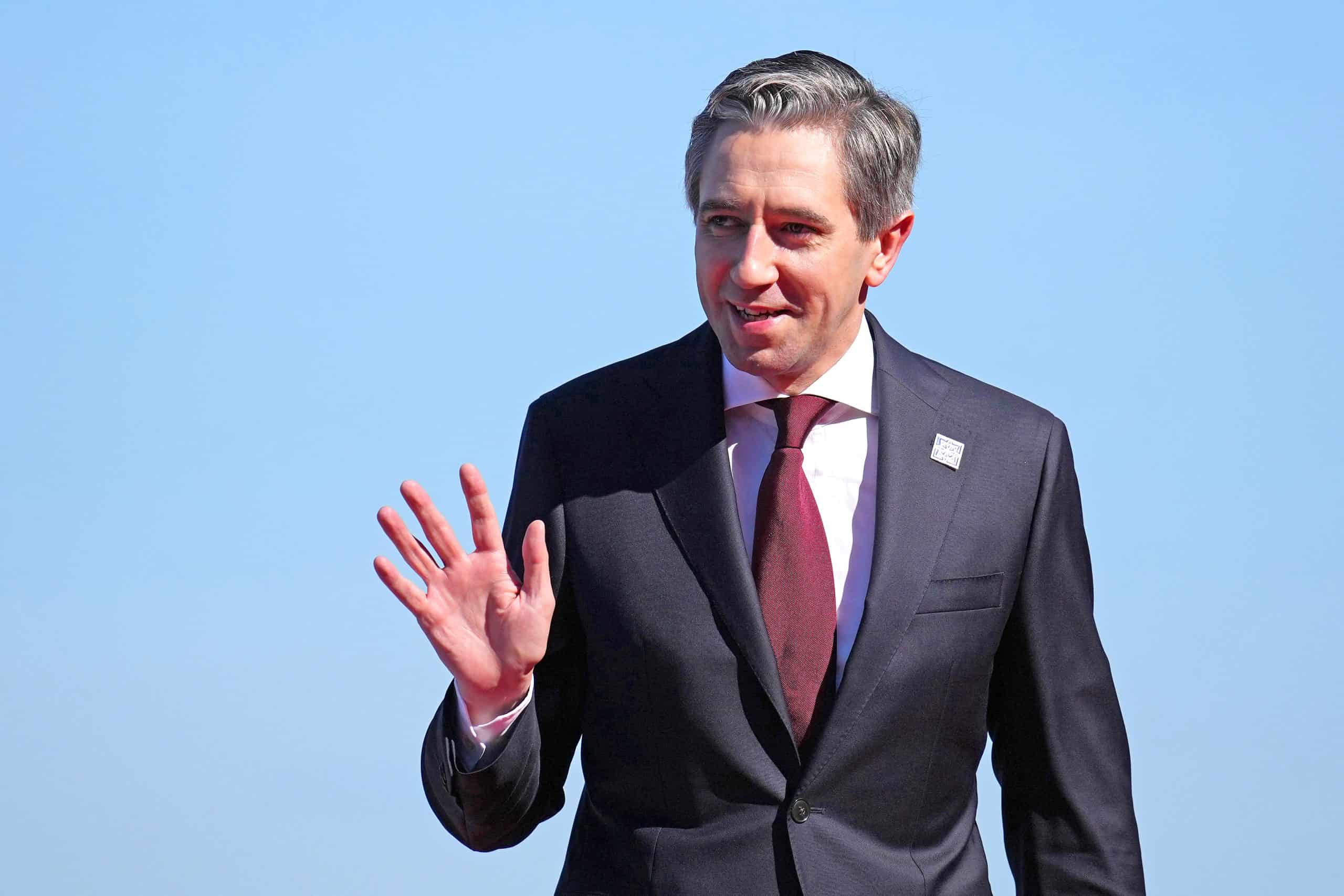
- Country: Ireland
- Approval: 43%
Simon Harris is the Taoiseach of Ireland and the leader of the liberal-conservative Fine Gael party. The previous Taoiseach resigned in March of 2024, and Harris was the only candidate left to take up the position. He has since been called the “TikTok Taoiseach”.
He hasn’t had much time to do anything of note, but one of his first major decisions was to formally recognize the state of Palestine in May of 2024, which significantly strengthened his popularity.
#7 Keir Starmer
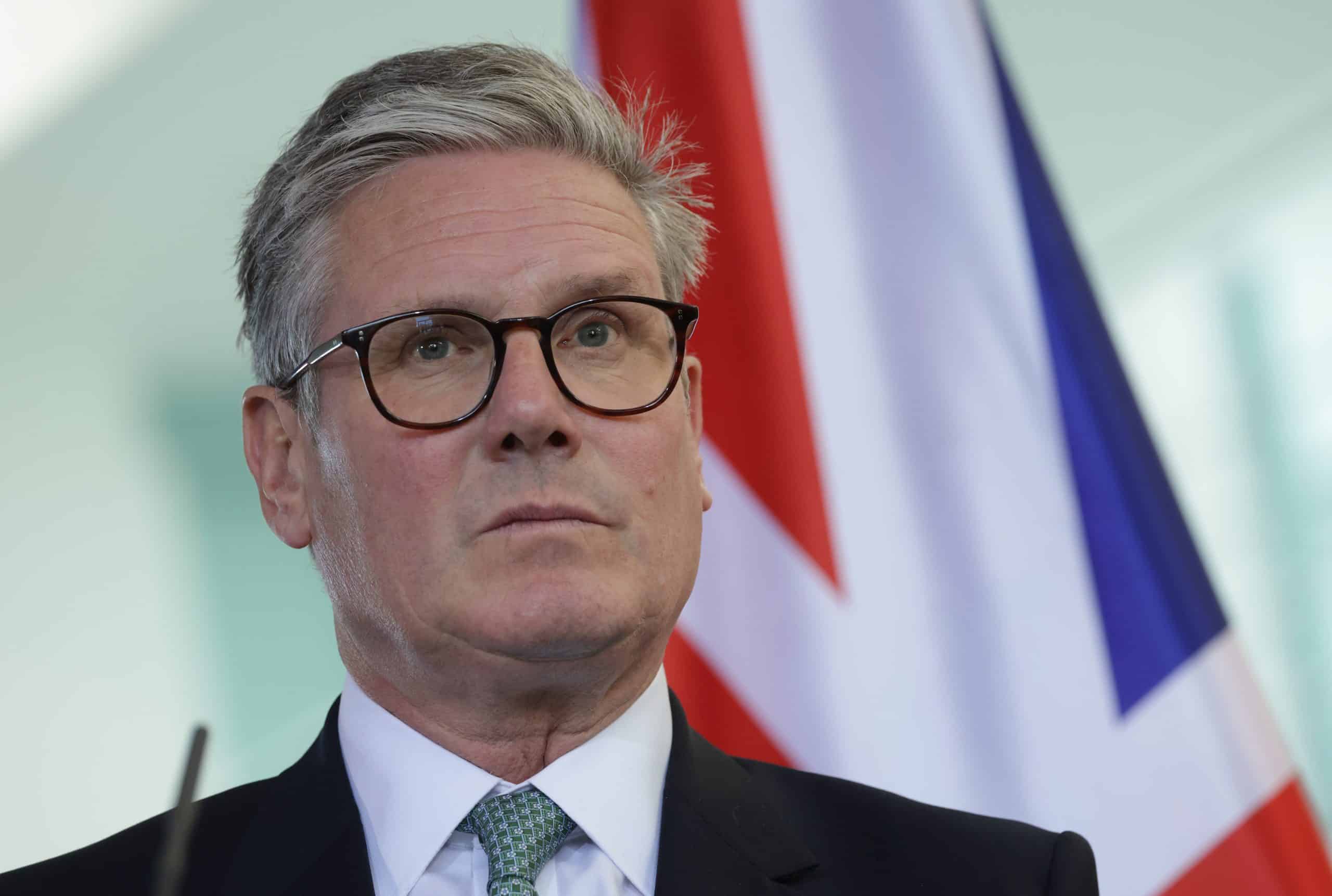
- Country: United Kingdom
- Approval: 44%
Keir Starmer is the brand-new prime minister of the United Kingdom, having assumed the role in July of 2024. He is the leader of the Labour Party.
After the absolutely abysmal and disastrous track record of the Conservative Party over the last 14 years, leading to the abysmal state of the economy, immigration, and many other aspects of British life, Starmer led his party to a landslide victory on promises of economic growth, government reforms, and investments in healthcare, childcare, energy, workers’ rights, education, and more.
With political, religious, and economic tensions and violence at a breaking point in the country, we await Starmer’s success or failure to change the trajectory set by his predecessors.
#6 Luiz Inacio Lula da Silva
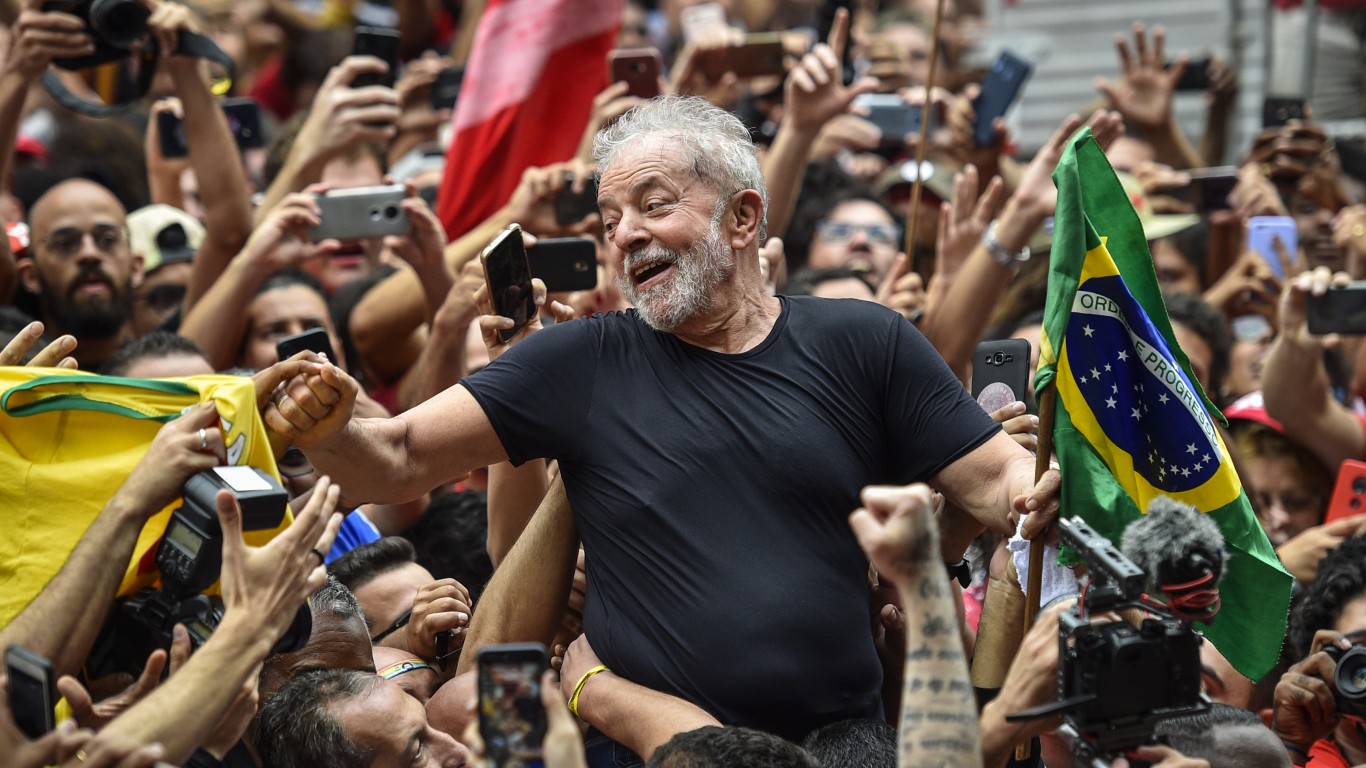
- Country: Brazil
- Approval: 44%
Luiz Inacio Lula da Silva has served as the 35th president of Brazil from 2003 to 2011 and now the 39th president since 2023. Lula never finished school after quitting in second grade and didn’t learn to read until he was ten. He led workers’ strikes against Brazil’s military dictatorship.
He has been one of Brazil’s most popular leaders, with an approval rating reaching as high as 80%. His first term, however, was plagued by scandals, and was eventually convicted of money laundering and spent 580 days in prison. His conviction was eventually overturned in 2021.
In his current, third term as president, he has promised to address the economic crisis in the country, fighting poverty, increasing education, and expanding housing. He has also said that the Israel-Hamas war is “not a war, it’s a genocide”, and even compared it to the Nazi Holocaust.
#5 Donald Tusk
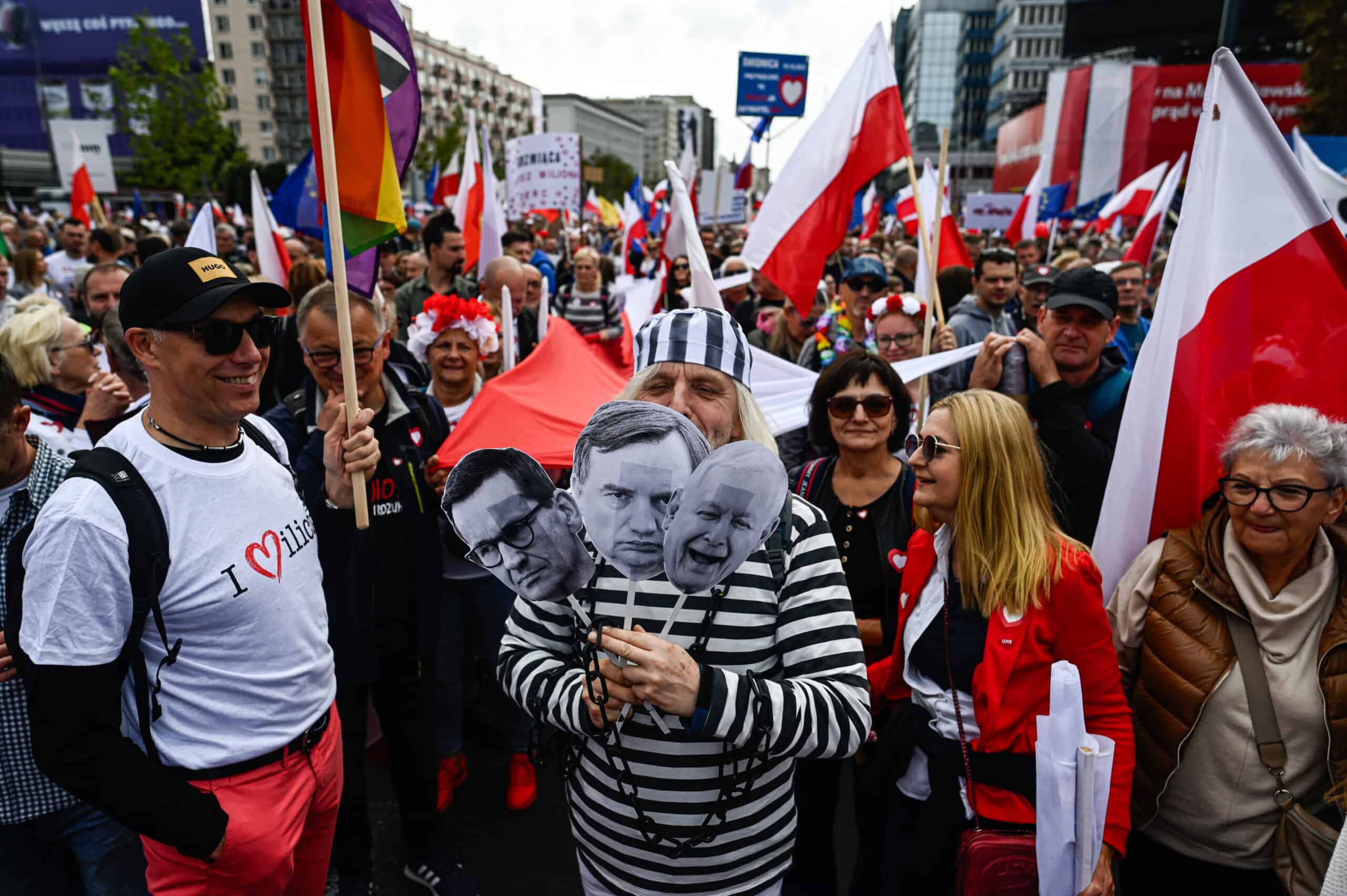
- Country: Poland
- Approval: 47%
Donald Tusk was appointed the prime minister of Poland in 2023 and is a member of the center-right Civic Platform party. This is his second time serving as prime minister.
One of his first acts in power was to replace all the top executives of the independent public service broadcast company, accusing it of being a propaganda machine. He has also called for increased LGBT rights in Poland. He has also been a strong advocate for more Polish autonomy in the European Union.
#4 Viola Amherd
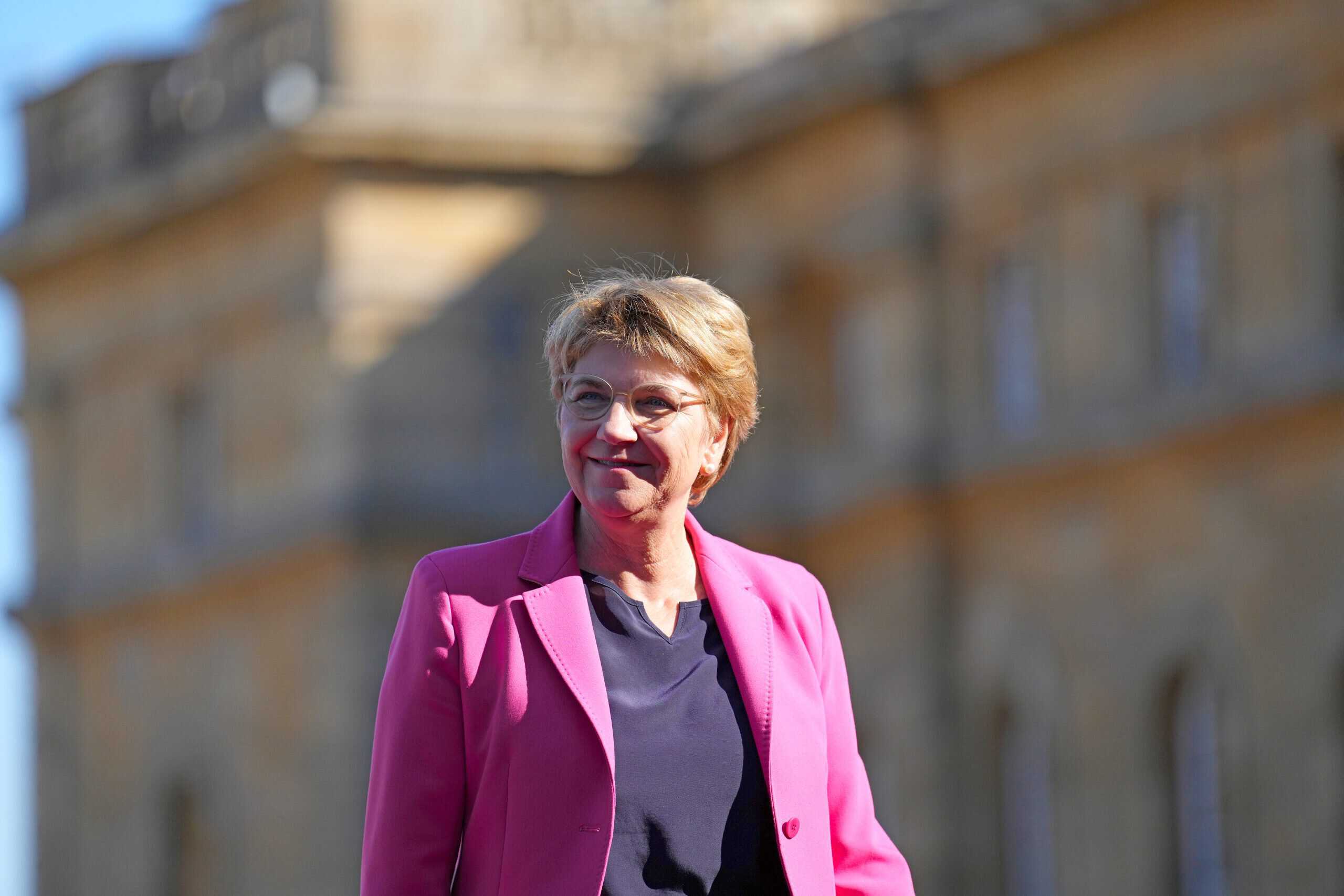
- Country: Switzerland
- Approval: 58%
Viola Amherd was elected president of the Swiss Confederation on January 1, 2024, and is a member of the center-right The Centre party.
Unlike other countries, the president of the Swiss Confederation is the head of the seven-member Federal Council and only holds office for one year.
She has not done much of note with her time in office, since she is only the first among seven members of the council, but has called for strengthening Switzerland’s military.
#3 Andres Manuel Lopez
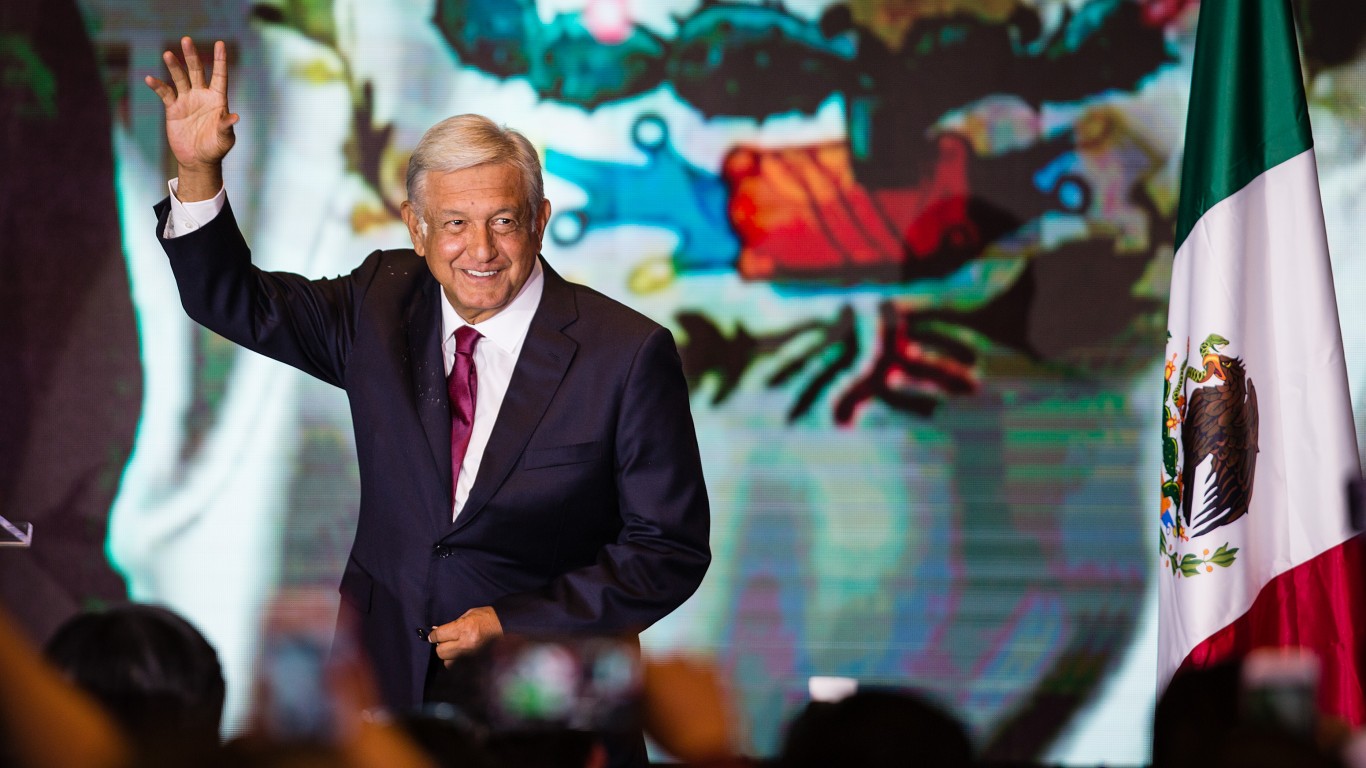
- Country: Mexico
- Approval: 61%
Andres Manuel Lopez was elected president of Mexico in 2018 and is a member of the left-wing Morena party.
During his time in office, Lopez has been a strong advocate for reducing inequality and investing in public sectors that were liberalized and privatized by previous administrations. He has focused on improving the state of working-class people. He has also done substantial work to address corruption in his government and improve the education system in Mexico.
His successful reforms and investments in his country prioritized his people over the market and resulted in his high approval rating.
#2 Javier Milei

- Country: Argentina
- Approval: 62%
Javier Milei was elected president of Argentina in 2023 and is a member of the right-wing Libertarian Party. He is known as a flamboyant politician who supports anarcho-capitalist economic principles.
Even though he calls himself a libertarian, he opposes abortion and euthanasia and strongly supports Israel. One of his first acts as president was to deregulate the economy, leading to a general strike, he also cut funding to universities which led to student protests, and cut spending on many public projects, leading to union strikes.
As a result of Javier Milei’s devaluation of Argentina’s currency, the poverty rate in Argentina has jumped to 57%.
#1 Narendra Modi
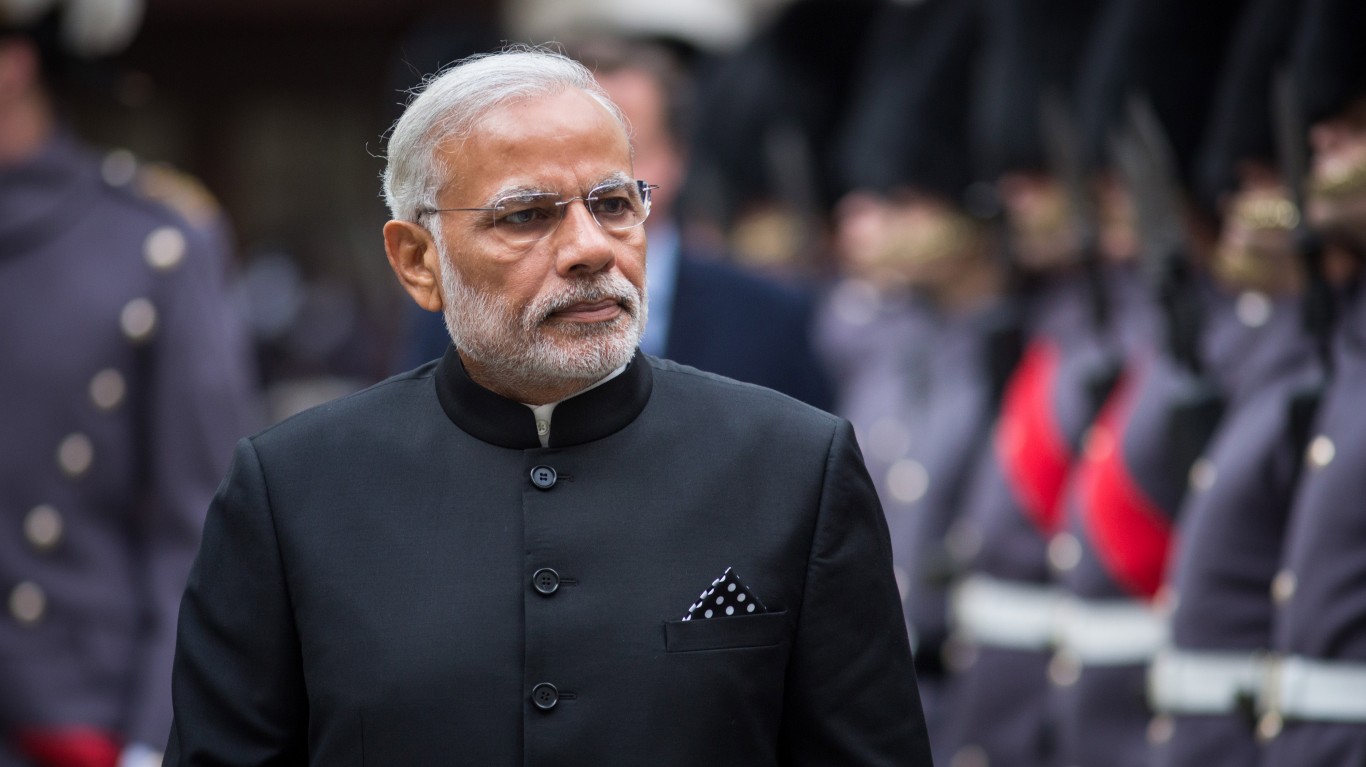
- Country: India
- Approval: 70%
If you were already skeptical of public opinion polls before reading this list, this is the point where your hope dies.
Narendra Modi has been the prime minister of India since 2014 and is a member of two Hindu nationalist parties, including the RSS paramilitary volunteer group.
Under his leadership, the Gujarat government committed the 2002 riots in which 2,000 people were killed, mostly Muslims.
Modi’s government has been extremely focused on improving India’s economy and increasing the wealth of the rich while ignoring health, education, and poverty. His policies also led directly to the 2020 Delhi riots, in which Muslim citizens were attacked and killed by Hindus.
India’s democratic institutions have withered under his leadership, with many examples of intimidation and political violence against journalists and opponents. He has used his power to intimidate critics in academia and promote Hindu-nationalist causes that violently suppress opposition. He has been responsible for the eradication of civil rights and freedom of the press in India.
Modi has enjoyed consistently high approval ratings, in part due to manipulation of public media.
Cash Back Credit Cards Have Never Been This Good
Credit card companies are at war, handing out free rewards and benefits to win the best customers. A good cash back card can be worth thousands of dollars a year in free money, not to mention other perks like travel, insurance, and access to fancy lounges. See our top picks for the best credit cards today. You won’t want to miss some of these offers.
Flywheel Publishing has partnered with CardRatings for our coverage of credit card products. Flywheel Publishing and CardRatings may receive a commission from card issuers.
Thank you for reading! Have some feedback for us?
Contact the 24/7 Wall St. editorial team.
